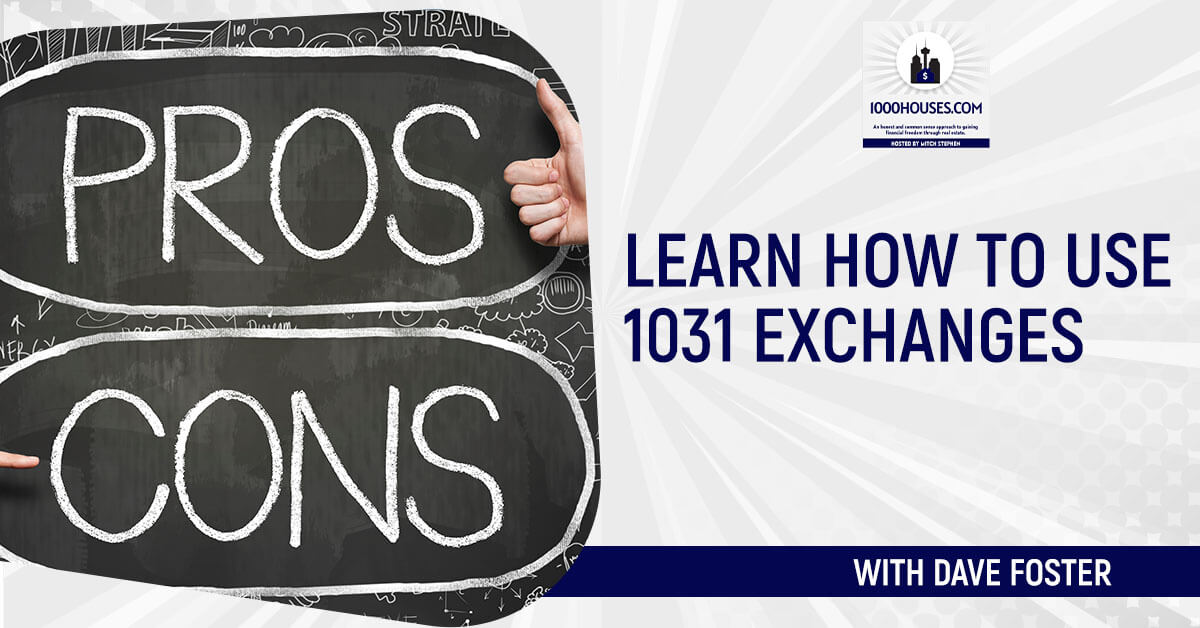PODCAST
Learn How to Use 1031 Exchanges With Dave Foster


Mitch Stephen chats with
Dave Foster
Episode 547: Learn How to Use 1031 Exchanges With Dave Foster

What is a 1031 exchange? What are its pros and cons? Before doing a 1031 exchange, listen first to this episode and gain some tricks and strategies from Dave Foster, founder of The 1031 Investor. He talks about 1031 exchange in a nutshell and shares some tips on how you can use it to defer taxes in real estate. Plus, he explains the Four Ds in 1031 exchange. Tune in to this informative episode to understand how you can use this provision to increase your bottom line.
—
Watch the episode here
I’m here with Dave Foster and we’re going to be talking about 1031 exchanges. Before we get to that, I would like to thank the sponsor of the show, LiveComm.com. It’s all about smartphone numbers. You can buy smartphone numbers at LiveComm. These smartphone numbers come with a text distribution list attached to them.
When anyone calls your LiveComm.com phone number, if they call it from their cell phone, you will capture their cell phone number. It will be put in a distribution list and you can text those people at will. Once they’ve opted into your phone numbers or called your company, they’re your customer now and you’re allowed to communicate with them through texts until they say stop it in.
This has been instrumental in my sales. I am four days on the market with my sales. I have over 10,000 people that have called my LiveComm phone numbers out in front of the houses for owner-financed houses. All those people on the list are interested in owner-financed houses. I don’t even put signs in my yards anymore. I have 10,000 people I send out a text that says, “I have a new owner-financed home for sale, check it out.” I put a little tiny URL there and 10,000 people for $0.02 a piece, I hit them right between the eyes on their phone with a text and they get a prize for the new house I’ve put on the market for sale with owner financing.
I average four days on the market with no signs at my house. It took a little while to get to that level. I send out a message about every six months to all those 10,000 people that say, “If you’re no longer interested in an owner finance home, reply with the word stop and get off this list.” I still have 10,000 people on my list. They won’t leave. They’re sincerely interested in the product I have and there are so many ways to use LiveComm. You can check out the videos on the homepage, LiveComm.com.
Check it out. It is so affordable and makes so much sense. It’s not even funny. I don’t know why everyone doesn’t have smartphone numbers. I know no business in the world that doesn’t want to collect the phone number of the prospect that called them and be able to text them. I don’t even understand why you wouldn’t do that. All right, thank you, LiveComm. Sorry, I had to pay the bills there, Dave. How are you doing?
Awesome. It’s great to be here. I’m disappointed. I wish we would have postponed this for a couple of weeks.
You could have had a LiveComm number.
That also but we could have been doing a 1031 podcast on the 1,031 homes. It would have taken a couple of weeks.
Honestly, I hit 1,000 houses in 2008 when I wrote my first book, My Life & 1000 Houses: Failing Forward. Since then, it’s about 3,000 and something.

1031 Exchange: I’ll find the property to buy before putting up my property for sale because of the timeframe.
I’m late to the party. That’s okay.
I liked the sentiment though. That’s good. Let’s kick off here. You specialize in 1031 exchanges. I think where we have to start is what is a 1031 exchange in a nutshell? The abbreviated definition.
Let’s do a little history walk. Think back to 1910 and 1920. As our country was coming out and the agricultural industry was blossoming but more importantly, the industrial revolution had happened. It was starting to come into America. Our country desperately needed the agricultural industry to grow. The problem was that all of the nation’s farmers had properties that if they sold them to buy new farms and ranches, by the time they paid the tax on their sale, they would not have enough money to go buy the new farm. They couldn’t grow.
The farmers that want to be farmers that wanted to get into it, there were no small farms for them available. In 1920, Congress enacted section 1031 of the code which allows people to sell investment real estate and using a process, go and buy investment real estate, and get to indefinitely defer tax on the profit from the sale. Those farmers could sell their small farms and buy big farms. The factory owner could sell his factory and buy two bigger factories. That adds gasoline to the fire of the US economy for decades.
In 1996, there was a huge lawsuit settled that made these things available to folks like you and me, anybody who is a real estate investor. That’s what the 1031 exchange does. It lets you sell a piece of property that you may have a significant amount of profit in, buy new real estate, and indefinitely defer paying that tax.
If you make $100,000 on a piece of property, your capital gains might be $20,000 or so by the time you count Federal and state. That’s $20,000 of tax that instead of paying to the US Government, you get to put in your pocket or put into your portfolio to make a return on a deferred tax. Instead of buying a highway or a new M16 for the military, you’re buying a house for yourself and you’re generating profit from it. You got to see where that takes you in terms of building wealth.
You picked 20%. The maximum tax bracket out there is 38%. You might have to add it to your income and you couldn’t be in a higher tax bracket. Usually, in a lot of properties, you’re getting long-term capital gains or short-term capital gains, so it’s already set around 2025, depending. I’ve used these before. The way I used them was I had a property I wanted to sell. I was going to make a lot of money on it. I would go out and usually, I wanted to sell the property, let’s say one of my small storage because I wanted to buy bigger and nicer storage that’s closer to me or whatever.
The problem with 1031 exchange that I hear the most and that I feel the most is you usually want to sell in the booming market, so the prices are high. You sell but you only have a limited amount of time. You have a timeframe that you have to identify these properties that you want to roll over to or exchange to. Now, you’re trying to buy in the booming market too. A lot of times, I don’t like working under that kind of pressure. Usually, what I’ve done is I’ll find the property I want to buy before I even put up my property for sale because they don’t allow you that much time. How much time do you have by the time you say, “I want to do a 1031.” First of all, I think you have to own the property for at least a year. Is that correct?
There’s no statutory requirement on that.
1031 exchange allows people to sell investment real estate and, using a process, go and buy investment real estate and get to him, definitely defer tax on the profit from the sale. Share on XIs there a case law?
There is case law. Here’s what the case law says, “Two tax years, two calendar years.” It didn’t take the attorneys very long to figure out that it meant anything from 2 days to 760 days.
Two days and if you closed on one year and went right on the 30th, you did it.
The standard is that it must be a property that you held with the intent of using it for productive investment. What doesn’t qualify is your primary residence. That has got some more favorable rules. What doesn’t qualify is a property that you purchased primarily with the intent of reselling. The term that we’re using in this market is the fix and flipper. I buy a property because I want to fix it up and sell it. That does not qualify for 1031 treatment, but what about a fix and flip or what I’m doing is I’m buying it. I’m fixing it up. I’m putting a renter in it and later, maybe after a year, I decided to re-evaluate where I’m at with it.
It’s properties you have the intent to what?
To hold for productive use in business trade or investment. Anything that you’ve got a longer-term horizon on, but there’s no statutory definition of what that horizon is. Most people do feel comfortable with anything more than a year but there could always be reasons why less than a year might be appropriate. For instance, my guy in the Smoky Mountains sold the cabin after 60 days. He owned it for 60 days.
I said, “This feels an awful lot like a flip. Do you intend to sell it?” He goes, “No. I had to honor the contract to the long-term tenant in my purchase agreement.” I said, “The tenant moved out, so why are you selling it?” He goes, “They moved out because of the bear. I’m not going to mess with a rental where there’s a bear that had taken up residence in the trashcan of that house.” Was his intent to sell? No. His intent was to hold. Both he and his accountant thought that the photographs of the bear were probably pretty good evidence.
That’s very interesting. I also want to point out something that I thought of myself a while back. When you set up your LLC and the real estate investment company, you may want to put in the mission that its intent is to buy and hold properties. Don’t say, “The intent of this company is to buy and flip properties,” if you’re looking at 1031 tax strategies. In your mission statement, don’t mention that you’re in it for the long haul, that you’re buying things to create a future income for years and years, that you’re a buy and hold guy or whatever over the same thing. You can go ahead and flip all the houses you want to. There’s no law against it but you don’t want it in your mission statement for your LLC or your corporation. You want it to say that you’re in for long-term business transactions.
A lot of folks will set up two entities. They will have one entity that flips or builds. They will have another entity that is designed to hold properties. That’s exactly what you’re saying.

1031 Exchange: Always check with your professionals regarding the law or financial advice.
Let’s give the disclaimer. We’re not attorneys. We’re not financial consultants. Always check with your professionals when it comes to the law or financial advice. These are our opinions and only our opinions. I think I need to do the CYA there, Dave. I love it because, on the particular properties, I sold them. I had my other properties identified within the time frame. I closed on the sale and it has to be held by a trustee. You’re not touching the money. This trustee then acquires the other property in its place.
It has to be performed by an unrelated third party. The beautiful thing is your auctions are no different than normal. You decide you’re going to sell a property. You list it for sale. You get a contract on it. The qualified intermediary steps in as part of the closing process so that when the property is sold, there’s the correct documentation. The proceeds go into an independent exchange account because you can’t touch the money, and then you go and purchase a property like you normally would.
Let’s be straight, you designate a property to be purchased and then you tell your trustee, “This is the one I want.”
That’s your identification list. That’s correct. You have 45 days to do that. However, when the purchase culminates, the QI should not take title to that property. You will be buying it yourself, but documentation will be part of the closing. The proceeds come in from the exchange account to do it. You sell and buy, but the QI is in the middle of all that. You’re right about the 45 days. Let’s go all the way back to where we started because that’s huge. You are right. There’s a poison pill with 1031 investing.
That is the absolute best time to sell a property and start at 1031 exchange. A seller’s market is the absolute worst time to try and find a new property. Here’s the deal. The absolute best time to buy properties is a buyer’s market. That’s the absolute worst time to sell and start a 1031 exchange. It involves a recognition of where the market is at and some realism. If you’re selling that self-storage for top dollar, unless you’re a savvy patient buyer, you’re probably not going to find something at the same price that you bought before.
You got to be a little patient, but there are a couple of ways to make that 45-days work for you. You hinted at the biggest one. That is to start your search well before you close the sale of your old property. I couldn’t tell you how many folks from California and Washington I’ve had in the last few months who have found their new property, and got it under contract before they even list their old property because they’re selling so quickly that they put their old property in the market. They get a cash offer with a 15-day close.
All that matters is that you close your sale before you take title to your new property. Find your new property first. Be focused in your search. Those kinds of things will help you. The encouragement, we’re still seeing over 90% of our exchangers complete their exchange with properties they like. It’s more of a perception than a reality. The properties are out there. You just got to do some light work.
There’s always a deal. It doesn’t matter what market. It has been the most boom market we’ve seen in a long time with the most competition as a real estate investor than we’ve ever seen. In 2022, houses are getting multiple offers over the asking price. I’m still out there and in the first quarter but I’m on a record pace year, under 50 properties in the first quarter of 2022 in a booming market. There are deals out there. You have to live where the chaos is, where the pain is or where there’s a change. Those places are death, transfer or divorce. It’s a lot of those.
I wanted to point out that Dave is here because he’s that intermediary for you. If you’re thinking about 1031 exchange and you want to talk to someone about how it works, and you think you have a reasonable profit or a big profit coming on the potential sale of a property that you know you could sell, Dave is here to talk to you about the ins and outs of it.
The problem with the 1031 exchange is you usually want to sell in the booming market. So the prices are high. But you only have a limited amount of time. Share on XThere’s no way we’re going to cover all the 1031 nuances. Every situation can be a little bit personal just like a fingerprint. There are ways to do things that you might not ever think of. Dave probably already knows how to get them done. I found ways to make things happen when I didn’t think there was a way just by asking the pros like, “This is my situation. Is there any way I can get this 1031 exchange done?” Let Dave put his mind and all of his years of experience. How long have you been doing this?
Twenty-three years. That’s how old I am.
That’s 23 years of doing the same thing over and over again. He doesn’t even have to be that smart to be that good at it after 23 years. You’re doing the same thing for many years. You’re on top of it. You learn lessons. You got bruises. You see things. You see all kinds of situations after 23 years. Dave probably got you covered. If there’s a chance in hell that you can get this done and get it done legally and get it done right, he’s probably going to tell you how to do it.
I’m going to take that as a compliment because it’s like my old grand papi said, “I would rather be lucky than good.”
That’s what I told you before when we were in the green room. I said, “I’m not brilliant at anything. I’ve just been doing the same thing for 27 years.” You learn the ins and outs of a strategy when you stay with it for that long.
What I tell people is to go back. Instead of thinking about 1031 as the structure, think about your why. What’s important is you. What’s your why? You and I were talking about that self-storage you sold. Why did you sell it? It’s because you wanted to buy a bigger one. The why was doing that. What if you paid market value for both? You still sold one at the top. You bought one at the top. I know you didn’t.
You might make $250,000 off of that sale.
The incentive is that deferred tax.
Especially if you’ve had properties for a long time and you’ve depreciated out. It means now you’re supposed to pay tax on the entire sales price. Give or take, a few.

1031 Exchange: The standard in the 1031 exchange is it must be a property you held with the intent of using it for productive investment use. Here’s what doesn’t qualify: primary residence and purchased primarily with the intent of reselling.
That’s right. I tell people to look at things like are you wanting to get rid of your property because it’s not renting as well or it has got potential CapEx that’s coming up that you’re going to have to pay maybe some major expenses? What about depreciation? Has it been depreciated out so you’re no longer getting that tax write-off? Are you wanting to move to a different location in the country? Are you wanting to go from residential to commercial or from single-family to multifamily? Those are all the why you would use to 1031. The result is you don’t pay any tax to get your why taken care of.
How can investors use the seller finance strategy? For investors that are seller financing, is there any way to use the 1031 exchange to help them?
There’s a hidden trick to that and it can be powerful. I’m speaking to the sweet spot right here, particularly for people who want to move their portfolio from active land-lording into passive note investing. It sounds like where you live, isn’t it?
That’s where I live.
Let’s start with the reinvestment requirements for 1031. If you want to defer all tax, you have to purchase at least as much as you sell, and you have to use all the proceeds from the sale and the purchase. Simple enough. Let’s say you wanted to sell a property and carry back an owner carry notes. I’m going to throw out an easy math scenario because I’m an accountant that’s horrible at math, so forgive me.
Let’s say you bought a property. You put $20,000 down and bought a $100,000 property a few years ago. Now you’re going to sell it. The note is down to $50,000 and you’re going to sell it for $50,000 down and you’re going to carry back a note yourself for the other $50,000. The $50,000 in cash is going to pay the mortgage off. What you’re left with in your account is the $50,000 note because that’s the proceed. That has to be used to buy your next property worth at least $100,000. How can you do that?
There are a bunch of different ways. Number one, you go to the open market and you sell that note. You and I both know that it’s probably going to take a pretty severe haircut because it’s a new note. It’s unseasoned. It’s on a property, etc. You could offer that note to the seller of the property who wants to buy. Chances are they’re not going to want it or you could find $50,000 of your own and replace the note with that. You could borrow from your 401(k), $50,000 limit right there. Borrow from your 401(k). Take it from a stock account. Borrow from your uncle. It doesn’t matter, but replace the note with $50,000 of cash in your exchange account.
Now, what does your exchange account have? It’s got $50,000 in cash. Can you use that to buy a new $100,000 property? You sure can. That completes your 1031. You deferred all tax and you’ve got a new income-producing property. What’s most important is that outside your exchange account, you own a note on a property that you’re very familiar with that’s generating income. That note has no gain in it because you paid $50,000. You received a $50,000 note. The only tax on that note is going to be on the interest that comes in each month. In one move, you did a 1031 exchange and deferred all the tax on the gain on a new performing asset. In your note-buying life, you have a fresh note generating monthly tax-free income.
People ask me, “If you’re so successful, why do you still do these shows?” I learned something all the time from the people I talked to. I’m trying hard to get smart people on this show.
The best time to sell a property and start at 1031 exchange a seller's market is the worst time to try and find a new property. Share on XSome would say, “You better try harder.”
You’ve already proven your worth. I just learned something. I would have taken a property that I had a note on and disregarded it as a 1031 exchange potentially. I wouldn’t have thought about that. That’s why I do these kinds of shows because it’s not just for you. I get to talk to some smart guys. He’s not charging me a consultant fee now and he’s all mine. I get to ask him whatever I want. You can go up and ask a guy if you could buy him lunch and rake his brain. He’ll tell you to go jump in a lake. If you ask him if you can interview him, it’s a whole different response most of the time.
Do you have any book or anything you would give away or a free consult or something?
I have a whole YouTube channel with about 32 videos. We’ve got calculators. We also do free consultations with folks. We live in the world of doing 1031 exchanges, but I am a strategy monger. I love to be creative. It makes it nice. We can do the nuts and bolts but where it benefits you is doing things like figuring out your why, and then finding the how that matches that.
We’re going to go to 1000Houses.com/1031exchanges. Everything we talk about will be over there, his podcast, his YouTube, and his contact information. If you want to get a free consult, it’s all over there. This is what I like about Dave for the same reason I like my friend, Tim Berry from TaxFreeFuture.com. It is about self-directed 401(k)s, IRAs, health savings accounts, and educational savings accounts. You can sign up with a multitude of people to set those accounts up.
The problem is when you go talk to them and need some creativity on your side to make things happen, the average trustee or qualified person that you’re talking to will tell you, “No, you can’t do it,” when there are ways to do it. There are usually choices. Those choices extend far beyond no. TaxFreeFuture.com, I love dealing with that company because the attorney that backs it up has been doing that law for 27 years. You tell him what you want to try to do. He’ll see if there’s a way to get it done besides, “No, that’s too complicated.”
The same thing with Dave here. If you want to do a 1031 exchange but you got a little bit of a unique circumstance or there’s a note on your property or whatever, call him and get a consult with him. Let him put his many years of experience to work for you before you take the first no that comes across your desk. I never take no. I only start thinking about no after I heard it three times in a row from three different people. I don’t like no. Do you remember when we used to have 411 and you could call for directory assistance? Do you remember that, Dave?
I can’t remember that.
You would call and say, “I’m looking for Joe Scigliano’s phone number.” They said, “He’s not listed.” You hang up. You call back 411 again and you get another guy, “I’m looking for Joe Scigliano’s phone number.” “We can’t find it.” You hang up and call back again and say, “I’m looking for Joe Scigliano’s phone number.” “It’s right here. I got it.” I learned that from 411. If you call enough times, someone will find the phone number. What’s the end game? The end game is to save on your taxes.

1031 Exchange: Before selling your old property, find your new property first, and focus on your search. Those things will help you.
Who was it that called compound interest the eighth wonder of the world?
Was it Einstein?
It was. The second half of that statement is, “Those who understand it will benefit from it. Those who don’t will pay for it.” That’s what all 1031 is. It’s an exercise in compound interest. If I shelter $20,000 in taxes on that first property, I use that $20,000 to go make another $20,000. I’m generating now interest income off of both $20,000 and it goes forward. In some of the classes we teach, we show an example where four transactions over twenty years. Not a thousand a year or so many forward transactions over an investor’s career. They can go from $100,000 in profit to owning $12.5 million of real estate simply by not paying the tax, but using that tax as an additional downpayment.
That’s the power of 1031 because the benefit of that $12 million is yours. That’s where it should be, but we’re not even going to leave it there. Can I tell you about the four D’s of 1031 investing because this is what sums it all up? The first D is defer. Anytime you sell a piece of property, do a 1031 exchange. Don’t pay the tax. You use the tax to build your portfolio.
The second D is defer. If you want to move locations in the country, types of real estate, income levels. If you want to go from active to passive, defer. The third D is, you might guess this, defer because while you are doing your 1031 exchanges. You can end up positioning your portfolio near you in retirement. You can go from active to passive for retirement. There is also no prohibition against converting an investment property into your primary residence.
Someone wanting to retire from Ohio to Florida might do 1031 exchanges to get their whole portfolio down into Florida a few years before they retire. When they sell, they’re going to sell their primary residence in Florida and that money is going to be tax-free where they are going to move. Convert one of those properties with all the deferred tax into your primary residence.
A few years later, you will be able to sell that property. You won’t get to take all of the gain tax-free but you will get a proration of the gain tax-free. If you follow the third D of defer, you’re going to get to pull out some of that gain over the years tax-free. Most people would say, “Dave, I’ll bet the fourth D is defer, isn’t it?” It’s not. The fourth D is die. I know it’s not the preferred option.
That’s like the tax strategy, defer, defer, defer, die. Good job.
When you die, your heirs will get all of your property. It’s what is called a stepped-up basis. They inherit your properties as if they paid market value for them as of the day you died. All of that deferred tax over all the years disappears and you give a legacy of tax-free wealth to your heirs. That’s how the four D’s work.
There's always a deal no matter what the market. Share on XThat’s amazing. I want to point out here. People say the rich get richer and the poor get poorer. The rich are studying this. As Einstein said, “The ones who understand it win. The ones that don’t understand it pay for it.” It’s the same throughout our whole life. The government puts incentives in the form of reduced or no tax in positions to drive an economy.
If anyone walks up to you and says, “I hate those people that pay zero tax,” you don’t understand how it works. The people that pay zero tax cause so much taxation that they’re given a reward because they cause more taxation than they could ever pay themselves or they drove an economy or moved more products. Every time a product move, there’s a tax paid on it. The truck has to roll. It gets sold to someone. There’s sales tax, gas tax, and Federal income tax for all the employees.
When you start to figure out what an entrepreneur does for an economy, he has no guarantees from anybody usually. He goes out and starts a business. If he’s savvy and has good consultants and advisors, and understands the tax code, he may get rewarded very well in the form of little to zero tax that he has to pay on income. The person who pays zero tax is not doing a disservice to this country. They’re getting that reward because they have done a great service for this country and caused all kinds of employment and taxation and products to move down the road. Do you agree with that statement, Dave?
Yes. A mentor of mine put it this way. He said, “Dave, don’t think of the tax code as a way to collect taxes. It’s not. They could do that in a number of different ways.” The reason why there’s not a flat tax is that the tax code exists to incentivize behavior. The behaviors that government wants you to do are incentivized by paying lower taxes. When you do a 1031 exchange, you’re benefiting by not paying tax, but what’s happening?
There are two realtors getting a check, two appraisers, two title companies, two attorneys, an inspector, and the people painting the house to get it ready. Every one of those people is paying ordinary income tax. They have a job so they’re putting into social security. What you’re doing by saving money and making more money for yourself, you are an economic engine for the Federal government. I tell people my best advice, be a good citizen and go make more money by doing 1031 exchanges.
Before we wrap it up, give us your best 1031 exchange story.
I could probably tell you one of our stories, which is fun. I don’t know if this is the best but using that strategy that we talked about, defer, defer, defer, then die. We took our portfolio from Colorado and we positioned it in Stanford, Connecticut because our goal was to move on to a sailboat and raise our boys. I grew up in Kansas. My wife grew up in Minnesota. I don’t know where the heck the sailboat thing came from and we were living in Colorado.
As we moved out of Colorado, we sold our home. That money was tax-free. Where did we move? We moved into one of our investment properties in Connecticut. By the time we had done that a couple of times, we were building up the kitty to buy the boat. Because I’m not the brightest guy, I realized after a year that two things were not going to happen. Number one, the sky was never going to turn blue, and the water was never going to get warm in Connecticut.
We decided it was time for Florida. We started to position our portfolio in Florida using 1031 exchanges, never paying tax, and then we moved to Florida. We’ve moved into our converted properties one at a time and sold them tax-free. By doing that, that’s how we bought the 53-foot sailboat with tax-free dollars from 1031 exchanges. We moved on to it, lived in it with our boys for ten years and raised them. The rest of the 1031 exchanges provided income for us to live through our short-term rental program. Over twenty years, we never paid a penny in capital gains tax out of a 53-foot sailboat and ate a lot of lobster.
There you go. There you have it. Dave, I would like to thank you for taking the time to come to the show. Everyone, go to 1000Houses.com/1031exchanges. Get over there. Get your consultant with Dave. Check out his YouTube channel. All kinds of stuff will be over there. Most of all, get that consultant. If you’ve got a property that you’re thinking you’re going to sell and it’s going to cost some major taxation for you, at least have the conversation. It can’t hurt anything.
I would like to leave with and thank one of my other sponsors TaxFreeFuture.com. If you’re thinking about self-directed retirement plans, we want to take control of your own financial future and quit letting those yahoos on Wall Street dictate what you make and what you don’t make, and you want to invest your own money, then take a look at TaxFreeFuture.com. Check out the little video vignettes there. My very favorite story is how you open up an account with very little money and you grow it to a lot of money in a short period of time. There is a way to do it. We’re out of here. Thanks a lot, Dave. We’ll see you on the other side.
Important Links
- 1000Houses.com/1031exchanges
- 1000Houses.com/tff
- 1000Houses.com/VA
- 1000Houses.com/101
- 1000Houses.com/aof
About Dave Foster
 Dave Foster, Founder and CEO of The 1031 Investor. Dave is a degreed accountant and serial real estate investor who is a qualified intermediary and consultant for tax saving strategies.
Dave Foster, Founder and CEO of The 1031 Investor. Dave is a degreed accountant and serial real estate investor who is a qualified intermediary and consultant for tax saving strategies.Love the show? Subscribe, rate, review, and share!
Join the Real Estate Investor Summit Community:











